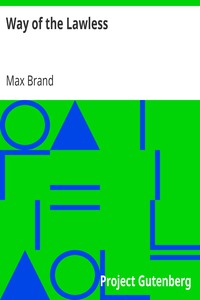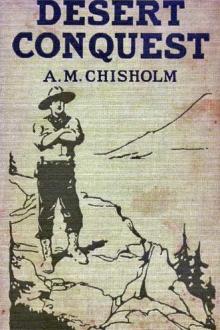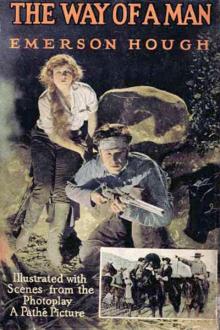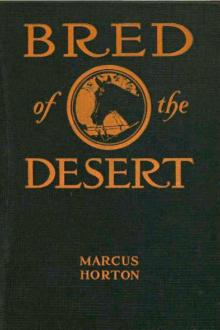Way of the Lawless, Max Brand [motivational novels for students txt] 📗

- Author: Max Brand
Book online «Way of the Lawless, Max Brand [motivational novels for students txt] 📗». Author Max Brand
The editor had spread his talents for the public eye in doing justice to it:
On the fifteenth of the month will be consummated a romance which began last year, when Charles Merchant, son of the well-known cattle king, John Merchant, went East and met Miss Anne Withero. It is Miss Withero's second visit in the West, and it is now announced that the marriage—
Andrew crumpled the paper and let it fall. He glanced at a calender on the wall opposite him. There remained six days before the wedding.
And he was still so stunned by that announcement that, raising his head slowly, his thoughts spinning, he looked up and encountered the eyes of Hal Dozier as the latter sank into a chair.
He did not complete the act, but was arrested in midair, one hand grasping the back of the chair, the other hand at his hip. Andrew, in the space of an instant, thought of three things—to kick the table from him and try to get to the side door of the place, to catch up the heavy sugar bowl and attempt to bowl over his man with a well-directed blow, or to simply sit and look Hal Dozier in the eye.
He had thought of the three things in the space that it would take a dog to snap at a fly and look away. He dismissed the first alternatives as absurd, and, picking up his cup of coffee, he raised his eyes slowly toward the ceiling, after the time-honored fashion of a man draining a glass, let his glance move gradually up and catch on the face of Dozier, and then, without haste, lowered the cup again to its saucer. The flush of his own heavy meal kept his pallor from showing. As for Dozier, there was a succession of changes in his features, and then he concluded by lowering himself heavily the rest of the way into his chair. He gave his order to the proprietor in a dazed fashion, looking straight at Andrew, and the latter knew perfectly that the deputy marshal felt that he was in a dream. He was seeing what was not possible to see; his eyes were telling his brain in definite terms: "There sits Andrew Lanning and ten thousand dollars." But the reason of Dozier was speaking no less decidedly: "There sits a man without a weapon at his hip and actually beneath the poster which offers a reward for the capture of the person he resembles. Also, he is in a restaurant in the middle of a town. I have only to raise my voice in order to surround him."
And reason gained the upper hand, though Dozier continued to look at Andrew in a fascinated manner.
Suddenly the outlaw knew that it would not do to disregard that glance so long continued. To disregard it would be to start the suspicions of Dozier as soon as his brain cleared.
"Hello, stranger," said Andrew, and he merely made his voice a trifle husky and deep. "D'you know me?"
The eyes of Dozier widened, there was a convulsive motion of his arm, and then his glance wandered slowly away.
"Excuse me," he said. "I thought I remembered your face."
Should he let it rest at that? No, better risk a finishing touch. "No harm done," he said in the same loud voice. "Hey, captain, another cup of coffee, will you? And a cigar."
He tilted back in his chair and began to hum. And all the time his nerves were jumping, and that old frenzy was taking him by the throat, that bulldog eagerness for the fight. But fight emptyhanded—and against Hal Dozier? The restaurant owner brought Dozier's order, and then the coffee and the cigar to Andrew, and while the deputy continued to look with dumb fascination at Andrew with swift side glances, Andrew finished his second cup. He bit off the end of his cigar, asked for his check, and paid it, and then felt his nerves crumble and go to pieces.
It was not Hal Dozier who sat there, but death itself that looked him in the face. One false move, one wrong gesture, would betray him. How could he tell? That very moment his expression might have altered into something which the marshal could not fail to recognize, and the moment that final touch came there would be a gun play swifter than the eye could follow—simply a flash of steel and a simultaneous explosion.
Even now, with the cigar between his teeth, he knew that if he lighted a match, the match would tremble between his fingers, and that trembling would betray him to Dozier. Yet he must not sit there, either, with the cigar between his teeth, unlighted. It was a little thing, but the weight of a feather would turn the balance and loose on him the thunderbolt of Hal Dozier in action.
But what could he do?
He found a thing in the very deeps of his despair. He got up from his chair, pushed his hat calmly upon his head and walked straight to the deputy. He dropped both hands upon the edge of Hal's table and leaned across it.
"Got a light, partner?" he asked.
And standing there over the table, he knew that Dozier had at length finally and definitely recognized him; but that the numbed brain of the marshal refused to permit him to act. He believed and yet he dared not believe his belief. Andrew saw the glance of Dozier go to his hip—his hip which the holster had rubbed until it gleamed. But no matter—the gun was not there—and stunned again by that impossible fact Dozier reached back and brought up his hand bearing a match box. He took out a match. He lighted it, his brows drawing together and slackening all the time, and then he looked up, his eyes rising with the lighted match, and stared full into the eyes of Andrew.
It was discovery undoubtedly—and how long would that mental paralysis last?
Andrew looked straight back into those eyes. His cigar took the fire and sucked in the flame. A cloud of smoke puffed out and rolled toward Hal Dozier, and Andrew turned leisurely and walked toward the door.
He was a yard from it.
"Lanning!" came a voice behind him, terrible, like a scream of pain.
As he leaped forward a gun spoke heavily in the room. He heard the bullet crunch into the frame of the door; the door itself was split by the second shot as Andrew slammed it shut. Then he raced around the corner of the restaurant and made for the grove.
There was not a sound behind him for a moment. Then a roar rose from the village and rushed after him. It gave him wings. And, looking back, he saw that Hal Dozier was not among the pursuers. No, half a dozen men were running, and firing as they ran, but there was not a rifle in the lot, and it takes a good man to land a bullet on the run where he is firing at a dodging target. The pursuers lost ground; they stopped and yelled for horses.
But that was what Hal Dozier was doing now. He was jerking a saddle on the back of Gray Peter, and in sixty seconds he would be tearing out of Los Toros. In the same space Andrew was in his own saddle with a flying leap and spurring out of the trees.
CHAPTER 31
By one thing he knew the utter desperation of Hal Dozier. For the man had fired while Andrew's back was turned. The bullet had followed the warning cry as swiftly as the strike of a snake follows its rattle. Luck and his sudden leap forward had unbalanced the nice aim of Dozier, and perhaps his mental agitation had contributed to it. But, at any rate, Andrew was troubled as he cleared the edge of the trees and cantered Sally not too swiftly along the Little Silver River toward Las Casas mountains, a little east of south.
He did not hurry her, partly because he wished to stay close and make sure of the number and force of his pursuers, and partly because he already had a lead sufficient to keep out of any but chance rifle shots.
He had not long to wait. Men boiled out of the village like hornets out of a shaken nest. He could see them buckling on belts while they were riding with the reins in their teeth. And they came like the wind, yelling at the sight of their quarry. Who would not kill a horse for the sake of saying that he had been within pistol range of the great outlaw? But, fast as their horses ran, Dozier, on Gray Peter, was able to keep up with them and also to range easily from group to group. Truly, Gray Peter was a glorious animal! If he were allowed to stretch out after the mare, what would the result be?
The pursuers, under the direction of Dozier, spread across the river bottom and, having formed so that no tricky doubling could leave them in the lurch on a blind trail, they began to use a new set of tactics.
Dozier kept Gray Peter at a steady pace, never varying his gait. But, on either side of him groups of his followers urged their horses forward at breakneck speed. Three or four would send home the spurs and rush up the river bottom after Andrew. If he did not hurry on they opened fire with their rifles from a short distance and sent a hail of random bullets, but Andrew knew that a random bullet carries just as much force as a well-aimed one, and chance might be on the side of one of those shots. He dared not allow them to come too close. Yet his heart rejoiced as he watched the manner in which Sally accepted these challenges. She never once had to lurch into her racing gait; she took the rushes of the cow ponies behind her by merely lengthening her stride until the horses behind her were winded and had to fall back.
If Andrew had let out Sally she would have walked away from them all, but he dared not do that. For, after he had run the heart out of the commoner ones, there remained Gray Peter in reserve, never changing his pace, never hurrying, falling often far back, as the groups one after another pushed close to Sally and made her spurt, gaining again when the spurts ended one by one.
There were two hours of daylight; there was one hour of dusk; and all that time the crowd kept thrusting out its small groups, one after the other, reaching after Sally like different arms, and each time she answered the spurt, and always slipped away into a greater lead at the end of it. And then, while the twilight was turning into dark, Andrew looked back and saw the whole crowd rein in their horses and turn back. There remained a single figure following him, and that figure was easily seen, because it was a man on a gray horse. And then Andrew grasped the plan fully. The posse had played its part; the thing for which the mountain desert had waited was come at last, and Hal Dozier was going on to find his man single-handed and pull him down. Twice, before complete darkness set in, Andrew had been on the verge of turning and going back to accept the challenge of Hal Dozier. Always two things stopped him. There was first the fear of the man which he frankly admitted, and more than that was the feeling that one thing lay before him to be done before he could meet Dozier and end the long trail. He must see Anne Withero. She was about to be married and be drawn out of his world and into a new one. He felt it was more important than life or death to see her before that transformation took place. They would go East, no doubt. Two thousand miles, the law and the mountains would fence him away from her after that.
During the last months he accepted her as he accepted the stars—something far away from him. Now, by some pretext, by some wile, he must live to see her





Comments (0)